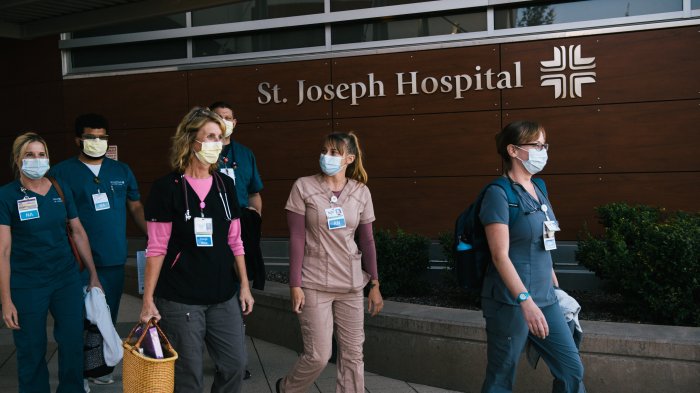Why do nurses hate med surg – Why do nurses hate med-surg? As this question takes center stage, we delve into the complexities of medical-surgical units, uncovering the unique challenges and stressors that can make this setting a challenging one for nurses.
Med-surg units are characterized by high patient turnover rates and acuity levels, placing a significant workload on nurses. Inadequate staffing levels and excessive workloads can lead to burnout and compassion fatigue, negatively impacting nurses’ mental and physical health.
Understanding the Nature of Med-Surg Units

Medical-surgical (med-surg) units are unique environments within hospitals, catering to a diverse patient population with varying medical and surgical needs. These units are characterized by high patient turnover rates and acuity levels, posing unique challenges and stressors for nurses working in them.
The fast-paced nature of med-surg units, with patients frequently admitted, discharged, or transferred, requires nurses to be highly adaptable and efficient in managing patient care. The acuity levels of patients in these units can also vary significantly, ranging from stable patients recovering from surgery to critically ill patients requiring close monitoring and intervention.
Patient Acuity and Staffing Levels, Why do nurses hate med surg
The acuity level of patients in a med-surg unit directly impacts the workload and stress levels of nurses. Higher acuity patients require more intensive care and monitoring, often resulting in increased nursing time and effort. Conversely, lower acuity patients may require less nursing attention, allowing nurses to allocate their time more efficiently.
Staffing levels in med-surg units are often determined by the patient acuity and nurse-to-patient ratios. When staffing levels are inadequate, nurses may experience increased workload, decreased patient satisfaction, and burnout.
Communication and Collaboration
Effective communication and collaboration are crucial in med-surg units, where nurses work closely with physicians, other healthcare professionals, and patients’ families. Nurses must be able to clearly communicate patient information, treatment plans, and any changes in condition to ensure continuity of care.
Collaboration among healthcare professionals is essential to provide comprehensive and coordinated care to patients. Nurses often work in interdisciplinary teams, including physicians, pharmacists, social workers, and physical therapists, to address the diverse needs of patients in med-surg units.
Workload and Staffing Issues

The relentless demands of Med-Surg units, characterized by high patient-to-nurse ratios and excessive workloads, have a profound impact on nurses’ well-being. The pressure to provide comprehensive care to multiple patients simultaneously can lead to feelings of inadequacy, burnout, and compassion fatigue.
Inadequate staffing levels, often driven by budgetary constraints or nursing shortages, exacerbate the workload burden. This can compromise patient safety and quality of care, as nurses may be forced to prioritize tasks or delegate responsibilities to less experienced staff.
Impact on Nurses’ Well-being
- Increased stress and anxiety
- Physical exhaustion and burnout
- Emotional distress and compassion fatigue
- Reduced job satisfaction and motivation
Consequences for Patient Care
- Delayed or missed nursing interventions
- Increased risk of medical errors
- Compromised patient safety
- Reduced patient satisfaction
Lack of Support and Recognition: Why Do Nurses Hate Med Surg

Nurses in med-surg units often report feeling unsupported and unrecognized, contributing to their negative feelings towards the unit. This lack of support can manifest in various ways:
Emotionally, nurses may feel isolated and alone, with limited opportunities to connect with colleagues or receive encouragement. The fast-paced and demanding nature of med-surg units can make it difficult for nurses to find time to debrief or seek support from their peers.
Practically, nurses may also lack the resources and assistance they need to perform their jobs effectively. This can include inadequate staffing levels, limited access to equipment, or a lack of training opportunities. The lack of recognition can further exacerbate these feelings, as nurses may feel their hard work and dedication are not valued.
Limited Opportunities for Professional Development and Recognition
Med-surg units often provide limited opportunities for nurses to advance their careers or gain recognition for their achievements. This can lead to feelings of stagnation and a lack of motivation. Nurses may feel that their skills and knowledge are not being utilized or appreciated, which can contribute to negative feelings towards the unit.Additionally,
the lack of recognition can make it difficult for nurses to feel valued and respected. This can lead to a sense of burnout and a desire to leave the med-surg unit for other opportunities that offer more support and recognition.
The repetitive tasks and lack of autonomy in med surg can drive nurses to seek greener pastures. The constant influx of patients, often with complex medical needs, can create a sense of being overwhelmed and underappreciated. It’s no wonder that nurses might draw parallels to the protagonist of catcher in the rye conflict , who also grappled with the challenges of a world that seemed indifferent to his struggles.
While the experiences of Holden Caulfield and med surg nurses may seem vastly different, they share a common thread: the frustration of feeling unseen and undervalued.
Lack of Autonomy and Control

Med-surg units often operate under strict protocols and bureaucratic constraints, limiting nurses’ autonomy and decision-making authority. This can lead to frustration and dissatisfaction, as nurses feel their professional judgment is not valued or respected.
Rigid Protocols
Med-surg units often have rigid protocols in place for patient care, leaving little room for nurses to exercise their clinical judgment. This can be particularly challenging for experienced nurses who may feel their expertise is not being fully utilized.
Bureaucratic Constraints
Nurses in med-surg units may also face bureaucratic constraints, such as excessive paperwork and administrative tasks. This can take away from the time they have available to provide direct patient care, further limiting their autonomy and job satisfaction.
Workplace Culture and Relationships

The workplace culture on med-surg units can significantly impact nurses’ job satisfaction and well-being. Negative workplace cultures, characterized by a lack of teamwork and support among colleagues, can create a stressful and unfulfilling work environment.
Interpersonal Conflicts and Hierarchical Structures
Interpersonal conflicts between nurses can arise due to differences in personalities, work styles, or communication issues. These conflicts can disrupt teamwork and create a hostile work environment. Hierarchical structures within hospitals, where nurses are often supervised by physicians and administrators, can also contribute to feelings of powerlessness and resentment among nurses.
Impact on Nurses’ Mental and Physical Health

The demanding nature of med-surg units takes a significant toll on nurses’ mental and physical well-being. Chronic stress, burnout, and compassion fatigue are common experiences, leading to a range of adverse health outcomes.
Physical Ailments
- Musculoskeletal disorders: Prolonged standing, lifting, and maneuvering patients can strain muscles and joints, leading to pain and injuries.
- Gastrointestinal issues: Stress and irregular mealtimes can contribute to digestive problems, such as stomach ulcers and irritable bowel syndrome.
- Cardiovascular disease: High levels of stress and workload can increase the risk of heart disease and hypertension.
Mental Health Issues
- Anxiety and depression: The constant pressure and emotional demands can lead to feelings of anxiety and low mood.
- Post-traumatic stress disorder (PTSD): Witnessing traumatic events and caring for critically ill patients can increase the risk of developing PTSD.
- Sleep disturbances: Shift work, irregular sleep patterns, and stress can disrupt sleep, leading to fatigue and impaired cognitive function.
FAQ Compilation
What are the main reasons why nurses hate med-surg?
High patient-to-nurse ratios, excessive workloads, lack of support, limited autonomy, and negative workplace culture are common factors contributing to dissatisfaction among med-surg nurses.
How does med-surg nursing impact nurses’ health?
Chronic stress, burnout, and compassion fatigue can lead to mental and physical health issues, including physical ailments and mental health disorders.